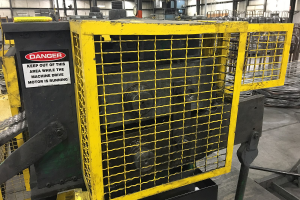Responding to OSHA’s New National Emphasis Program for Isocyanates
Joe Wolfsberger, former vice president of EHS for Ingersoll Rand, is joining FDRsafety as a senior advisor focusing on occupational health/industrial hygiene and has written the following blog post on isocyanates.
OSHA has announced the rollout of a National Emphasis Program for isocyanates, a three-year program that will focus on outreach efforts and inspections in general, construction and maritime industries. If you are in an industrial sector that uses isocyanate compounds this means you may be more likely to undergo an inspection from OSHA.
The products derived from isocyanates are everywhere in our daily lives. We sleep on them, insulate our houses with them, paint our walls and drive cars that contain them. Isocyanates are used in many industries including automotive, foundries, construction materials, coatings and adhesives.
The dangers associated with exposure to isocyanates range from occupational asthma to irritation of the skin, eyes, nose and throat to cancer. Deaths have been observed due to hypersensitivity pneumonitis and asthma attacks. OSHA has had exposure limits for isocyanates for many years but now has instituted an NEP to target inspections at locations using the chemical.
OSHA Visits
Inspections with begin with a review of the site’s chemical inventory and Safety Data Sheets (SDS) to identify areas of isocyanate usage. If it is determined that isocyanates are present, exposure records and injury and illness information will be reviewed for indication of exposures. The compliance officer may also interview employees with the potential for exposure and management.
The next step if a potential for exposure is identified is the completion of an exposure assessment to determine the level of risk. Air and wipe samples may be taken and an evaluation of the effectiveness of controls, (engineering, administrative and Personal Protective Equipment) will be conducted. If OSHA conducts monitoring, be sure to collect duplicate samples and have them analyzed by an American Industrial Hygiene Association accredited laboratory. This will provide a reference to compare to OSHA’s results in case there is a discrepancy.
Isocyanates are covered by other parts of OSHA’s General Industry, Construction and Maritime Standards and a review of the Hazard Communication Program, training program, respiratory protection program and housekeeping efforts may also be included as part of the inspection.
Preparing for NEP
How do you prepare for the Isocyanate National Emphasis Program? First determine if you use any isocyanates in your operations by reviewing your chemical inventory. The next step is to review your SDS’s to see if any the trade name chemicals are isocyanates or if any of your raw materials contain isocyanates.
If a potential for isocyanate exposure exists, an assessment should be conducted to include monitoring and a review of the effectiveness of controls. Isocyanates are very volatile and sampling should be conducted by an industrial hygiene professional. A review of pertinent records should also be conducted to include:
- Hazard Communication Records
- Training Records
- PPE and Respiratory Protection Program Records
- Operational Control Records related to handling of flammables and isocyanates
If you have any questions about the OSHA Isocyanate NEP or exposure assessments, contact Joe Wolfsberger at info@fdrsafety.com.


